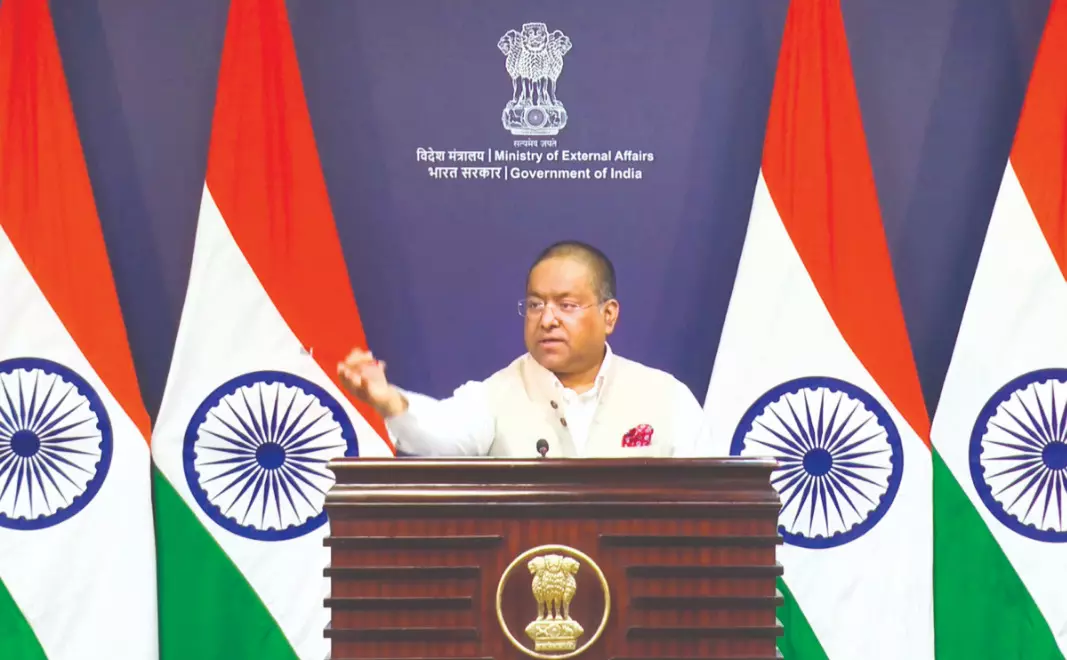India says no change in demand, Pak must vacate PoK; junks Trump’s mediation claim

NEW DELHI: India’s position on Jammu and Kashmir – the return of territory illegally occupied by Pakistan – has not changed, the External Affairs Ministry reiterated on Tuesday.
India is also determined that this issue be resolved bilaterally, the MEA said, rejecting US President Donald Trump’s recent claims that Washington was at the centre of negotiating the ceasefire between India and Pakistan.
At his weekly media briefing, the official spokesperson of the MEA, Randhir Jaiswal, told journalists that India has a “long-standing national position (on J&K) ... that issues pertaining to the Union Territory have to be addressed by India and Pakistan bilaterally.” This, the MEA spokesperson said, has not changed.
“And, as you are aware, the outstanding matter is the vacation of illegally occupied territory by Pakistan,” he said, in response to a question about Trump’s offer to broker a resolution.
On Monday night, in his first address to the nation since Operation Sindoor – India’s military response to the Pahalgam attack – Prime Minister Narendra Modi asserted there could be no talks over Kashmir, except over dismantling Pak’s terrorist infrastructure and returning Pak-occupied Kashmir.
On speculation on nuclear war by Trump, Jaiswal said the military action was entirely in the conventional domain.
“There were some reports that Pakistan’s National Command Authority will meet on May 10. But this was later denied by them. Pakistan’s foreign minister has himself denied the nuclear angle on record,” Jaiswal said.
“As you know, India has a firm stance that it will not give in to nuclear blackmail or allow cross-border terrorism to be conducted invoking it,” he said.
“In conversations with various countries, we also cautioned that their subscribing to such scenarios could hurt them in their own region,” he added.
He said that the punitive diplomatic and economic measures India announced against Pakistan following the Pahalgam attack will remain in place.
Jaiswal said India will keep the Indus Waters Treaty in abeyance until Pakistan credibly and irrevocably abjures support for cross-border terrorism. Pakistan nurtured terrorism on an industrial scale, he said.
Terrorist infrastructure that India destroyed under Operation Sindoor was responsible not only for the deaths of Indians but of many other innocents around the world, he said.
The MEA also made it clear that the ceasefire agreement was arrived at solely between the Director Generals of Military Operations (DGMOs) of India and Pakistan on May 10, during direct communication.
Jaiswal explained that the initiative to have the conversation at the level of DGMO was taken by the Pakistani High Commission and had been received by the MEA at 12:37 pm on May 10. The hotline communication later began at 3:35 pm on the same day, after initial technical issues from the Pakistani side.
“It was the effectiveness of Indian military action, particularly the precision strikes on key Pakistani airbases, that compelled Pakistan to seek cessation of hostilities,” the spokesperson stated, underscoring that no external power brokered the arrangement. “We have conveyed this position to all interlocutors both publicly and privately,” the official added.
Responding to Trump’s assertion of having prevented a nuclear crisis and using trade to pressure India and Pakistan to come to an agreement, the MEA stated that such statements are “factually inaccurate” and have been conveyed to Washington. “India has not accepted any mediation. The ceasefire was a result of direct military-to-military engagement,” the spokesperson confirmed.
India admitted that there had been talk with US leaders, and this included discussions about Operation Sindoor. However, it emphasised that trade had not figured in those talks.
On the issue of the Indus Waters Treaty (IWT), India reminded the world that the treaty was entered into in a spirit of friendship in 1960 but has been gravely eroded by Pakistan’s relentless encouragement of cross-border terrorism. Referring to the Cabinet Committee on Security (CCS) decision, India declared that the IWT has been put “in abeyance” and will continue to be so until Pakistan “credibly and irreversibly abjures support for terror”.
As a reaction to media hype following reports of nuclear leakage in Pakistan, the MEA made it clear that although social media reports and speculative articles have been doing the rounds, there has been no credible confirmation. Significantly, Pakistan’s foreign minister himself has publicly denied the allegations.
India also reaffirmed its policy of not giving in to nuclear blackmail. “We have made it clear to our friends that the use of nuclear threats in conjunction with sponsoring terrorism is a tactic which the world should not be legitimising,” said the official.
When it comes to India’s decision to add The Resistance Front (TRF) to the UN Security Council’s 1267 Sanctions Committee list, the MEA said the foreign envoys were briefed with dossiers having tangible evidence of the connection between TRF and the Pulwama-type attack in Perlikam. “TRF is a Lashkar-e-Taiba front. Intelligence intercepts and operational connections have been shown to the UN body,” the spokesperson said.
India has been actively working towards blacklisting the TRF for the last two years, with further details set to be presented to the UNSC monitoring team in the near future.
Regarding the reports of Chinese military gear being utilised by Pakistan, India stated that it has noticed the issue and will consider its implications on the bilateral relationship with Beijing.
The MEA reported that it is requesting information regarding the case of BSF constable PK Sahoo, who has been held captive by Pakistan for more than 20 days. The case is being investigated by the Ministry of Defence.



